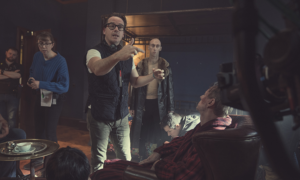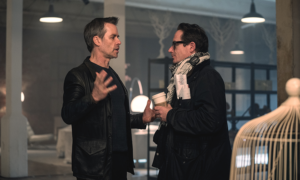Set in the near future in a Zone colony of state-of-the-art humanoid robots, Zone 414 follows private investigator David Carmichael (Guy Pearce) who is hired to find the Zone creator’s daughter, who has gone missing.
To do so, David teams up with Jane (Matilda Lutz), a highly advanced and self-aware A.I. Together they must move through the Zone’s dangerous iron jungle and piece together the mystery. However, this soon leads them to question the origins of Zone 414 and the true purpose behind the ‘City of Robots’…
We spoke to Zone 414 director Andrew Baird (pictured above) about being compared to Blade Runner and not being a fan of science fiction…
How did everything start for you with Zone 414?
It started with a music video I made for The Weeknd called Kiss Land. The fim’s writer Bryan Edward Hill saw that video, and he got ICM to send me the script. I suppose Bryan saw that video and saw a style that could be applied to the story.
What did you like about the script?
I’m a big fan of Bryan’s work – he’s written a lot of comic books and he’s a superintelligent writer. Look at the cast that came onto the movie, that’ll tell you how good the material was.
The script has got quite a bit of backlash for drawing from influences from various movies; obviously Blade Runner seems to keep coming up and it’s like, this is a detective story, it’s a noir, it’s Raymond Chandler – we’ve just done it in this strange little weird world. It’s noir first and foremost. I’ve really tried to humanise the sci-fi element of it as much as possible. That’s what I read in the script; that it was a very human story set in a very interesting world.
I’m not into sci-fi. I don’t like Star Wars, I don’t like Star Trek. It’s just not my thing, but what drew me to cinema… I saw Time Bandits when I was [young] and I was just like, ‘I want to do that, whoever does that world’. So of course it started for me with the world-building, but then when it got to making a movie, it wasn’t about the world-building, it was about the character, about storytelling.
It’s all to do with human elements. The whole robotics and ‘oh, are we gonna have robots in the future’ is interesting [but] they don’t interest me. I don’t care. I’m not interested in watching some robot walk around, making coffee. Who cares? I was drawn to the human mystery, the human element and the noir of the story.

What was it like having Matilda Lutz on board as badass A.I., Jane?
Matilda has really put a stamp on this film that’s much more elegant. We could have gone down a much more misogynistic, dark road with this movie. The Kiss Land video is a bit notorious and a bit misogynistic for sure. But Matilda said no, I don’t want this to be like that. I want it to be a positive female role model.
[One of her previous movies] Revenge, is a physical performance and when Matilda came up that’s what clicked. It was a tough, grimy role, so I could tell very quickly that this person has presence and strength. That’s what I wanted for Jane. Matilda is very petite but don’t judge a book by its cover. She’s tough. She’s strong. She’s intelligent, and she brought all of that to Jane and by and large the responses have been bloody positive, as they should be.
I think she’s a fine actress and I really hope that Zone 414 brings her lots of opportunities to explore this more. As I said, Revenge was a very physical performance, whereas Zone is much more of a psychological performance, and I think she’s carried that well. It’s no joke to go up against a master film actor like Guy Pearce!
Speaking of Guy Pearce. His character, David, is pretty mysterious…
It worked out that Guy ended up playing David, because he’s such a great actor. David is one of those iconic ‘The Man With No Name’ characters in westerns. They don’t say a lot, they don’t show a lot, they hold a lot in. Guy has nothing to prove as an actor, he just picks and chooses whatever creatively interests him, and he hadn’t done this role a lot. So it was, I suppose, something different for him to take on as well. Then he could, of course with his skill, bring all this subtlety to David and I loved what he did.
I think he did a wonderful job. I just think he brought great charisma to the role, and he’s just a wonderful actor and what an intro to my first feature film, to work with him! It took a few days but we then clicked and we really had a great relationship.

Can you tell us more about this near-future dystopian world and the Zone itself in Zone 414?
The world [is inspired] by what [William] Friedkin did with Cruising, and the world of the Eighties gay clubs in Manhattan. What I mean by that is this subculture, which was quite dangerous and was quite anonymous, was what I applied to the Zone. Because you’re going in there, you’re paying to be anonymous and to be able to do things that you couldn’t normally do.
So [the Zone is] this grimy, sleazy, disgusting sort of place and you’ve got this guy looking for this underage girl who’s disappeared into this world, and he meets this kind of star, she’s like a snowflake, Jane, like a little snowflake in this sea of shit.
On meeting each other, David’s humanity is triggered and they help each other find themselves again and get out of this cesspit.
What were your inspirations when creating the film?
I remember seeing The Fifth Element back when it came out and Luc Besson is a great visualist. He’s made some magnificent films. He brought in that French vibe into that kind of cyberpunk world. Judge Dredd was another movie [I was inspired by]. That had a tremendous influence on me as a design piece when I was studying to be an art director.
The story’s been told a million times. It hasn’t just been told with Blade Runner, but I suppose when you’re building a near-future world, it’s very hard to avoid these comparisons. It’s very tricky though, because there are certain kind of things that you can’t avoid in the near future. It’s where the world is headed, what Ridley Scott did with Syd Mead [for Blade Runner]. The only other way to do it is to go the clean white, Star Trek world and that’s bullshit. The world’s never going to be like that.
What’s next for you?
This is my first movie but I’ve nearly finished my second and got my third and fourth lined up.
I’m learning as I go how to improve as a filmmaker. The filmmakers who inspired me are the [people], who constantly make movies and genre movies and war movies and dramas and period movies and action movies. They’re the filmmakers that inspire me, not the ones who just do the same movie and just put a different spin on it.
I suppose that’s just genuinely because I’ve gone from this movie to a crime movie and the next movie is a love story, and the next movie’s a serial killer movie. So, it’s just the way I am!
What do you want audiences to take away from Zone 414?
Our intention was to make a film that spoke to everybody, and I think we’ve accomplished it remarkably well. I was looking for the human element and to tell a really good story. I brought in a British editor who worked on the Cracker TV show with Robbie Coltrane, and I said ‘forget about all the visuals, forget about all these endless science fiction references, in the end, this needs to be a solid Cracker episode of a whodunnit and find the missing girl!’
So it really is a noir detective story first and foremost, and I’m sorry if I disappointed or offended science fiction fans, but that’s secondary.
Zone 414 is available on digital download from 4 October
